广州版小学英语六年级下复习
广州版英语六年级下册复习要点

广州版英语六年级下册复习要点学生姓名:__________ 授课老师:董爱兰科目:英语同步班Module 1 Changes一.单词听写(教读单词,运用音节划分法以及音标法辅助孩子记单词)。
二.重点句型的复习(由老师说,学生答或者让学生整句翻译)。
三.知识重点:1.四种时态的复习:现在进行时A、构成形式:主语+be动词+动词的ing形式+其他。
B、判断依据:句中往往有now、look、listen等词。
注意:千万不要忘了一定得有be动词。
C、句型变换:练一练:A、用所给的动词的正确形式填空。
1) The boy _______( draw ) a picture now.2) What _____you _______( do ) now?3) Listen. Some girls ___________( sing ) in the classroom.4) My mother ___________ ( cook ) some nice food now.5) Look. They ______ ( have ) an English lesson.6) They _______( not water ) the flowers now.7) Look! the girls _______ ( dance )in the classroom . 一般现在时A、当谓语是be动词时,构成为:主语+be动词( am, is, are )+其他。
如:I am a student.B、当谓语是行为动词时,构成有两种:(1)主语(非第三人称单数)+动词原形+其他。
如:We often watch TV at the weekends.(2)主语(第三人称单数)+动词第三人称单数形式+其他。
如:Jim usually goes to the park on Sundays.C、句型变换:练一练:A、用括号内动词的适当形式填空。
广州最新版小学六年级英语下册知识点归纳和习题(全册)
广州版小学六年级英语下册知识点归纳和习题Unit 1 slow and steady wins the race一、课前小测1.稳健的_____________________2.赢_____________________3.尝试_____________________4.携带、扛_______________5.如此匆忙_____________________6.讲电话________________7.意思是_____________________ 8.骄傲的__________________9.不小心的_____________________ 10.耐心的________________11.记住_____________________ 12.悲伤的_______________13.努力地_____________________ 14.更努力______________二、词组记得牢in a hurry 匆忙in such a hurry 如此匆忙be like 像??一样be patient 耐心点talk on the phone 讲电话carry a heavy bag 背很重的包work harder 更努力地工作或学习slow and steady 稳打稳扎三、要点难点都知道1.try to do something 努力做某事,如She tried to eat with his left hand because his right hand was broken.因为右手受伤了所以她努力用左手吃饭。
2.in a hurry 匆忙、着急如:In the morning, everybody is in a hurry.早上的时候每个人都很匆忙。
3. You are like that silly hare.Like 像??一样,如:The flower is like a cup. 这花像一个茶杯。
广州最新版小学六年级英语下册知识点归纳和习题(全册)
六年级下册英语知识点总结第一单元(Unit1 How tall are you?)单词:tall—taller更高的short—shorter 更矮的strong—strong更强壮的old—older年龄更大的young—younger 更年轻的big—bigger更大的heavy—heavier 更重的long—longer 更长的thin—thinne更瘦的small—smaller 更小的dinosaur恐龙hall大厅metre,meter 米than比both 两个都kilogram千克,公斤countryside乡村low—lower更低的shadow阴影,影子smart—smarter更聪明的become开始变得,变成句子:1、That's the tallest dinosaur in this hall.那是这个厅里最高的恐龙。
2、You’re older than me. 你比我大。
3、How tall are you ?你有多高?I’m 1.65 metres.我身高1.65米。
4、What size are your shoes ?你穿多大号的鞋?5、My shoes are size 37. 我穿37号的鞋。
6 、Your feet are bigger than mine .你的脚比我的大。
7、How heavy are you ?你有多重?I’m48 kilograms .我体重48公斤。
8、It’s taller than both of us together .它比我们俩加在一起还高。
应该掌握的知识点:1、形容词变为比较级的变化规则:(1)一般情况下,在形容词的词尾直接加er。
如: tall—taller short—shorter.(2)以字母e结尾的形容词,在词尾直接加r,如:nice—nicer. late—later(3)以重读闭音节结尾,且结尾只有一个辅音字母的词,先双写这个辅音字母,再加er.如:big—bigger thin—thinner fat—fatter(4)以辅音字母加y结尾的双音节形容词,先变y为i , 再加er。
(完整版)广州新版英语六年级下册每单元知识点总结.docx
Unit 1slow and steady wins the race得牢in a hurry匆忙in such a hurry 如此匆忙be like 像⋯一be patient耐心点talk on the phone carry a heavy bag 背很重的包work harder 更努力地工作或学slow and steady 打扎三要点点都知道1. try to do something 努力做某事如: She tried to eat with his left hand because his right hand was broken. 因右手受了所以她努力用左手吃。
2.in a hurry 匆忙,着急如:In the morning, everybody is in a hurry. 早上的候每个人都很匆忙。
3. You are like that silly hare. Like 像 ??一 ,如 The flower is like a cup. 花像一个茶杯。
4.一般在表示在常反复生的作、存在的状或性的作的第三人称化律:1 一般情况直接加_____________________。
2 以 _____________________尾的加_____________________。
3 以 _____________________尾的去___________加___________________。
4 特殊情况 ________________。
unit2 waiting for another hare【知考点一】Ving 做主,用数名作主,在的基上加ing,使具有名的各种特征,可作名灵活使用。
Reading is an art. 是一种。
Climbing mountains is really fun. 爬山真是有趣。
_________ __________ believing. (眼)【知考点二】pick up1. pick up :起,拾起pick up sth = pick sth up 起某物pick up the hare = pick the hare up 若代,只能位于pick 与 up 之把它起来pick it up2.pick up :用()来接,到某去接某人,也可以是中途便把人或物走。
广州新版本英语小学六年级的下册的每单元总结复习学习知识点总结计划.doc

广州新版本英语小学六年级的下册的每单元总结复习学习知识点总结计划.doc广州新版英语六年级下册每单元知识点总结得牢in a hurry匆忙in such a hurry 如此匆忙 be like 像?一be patient耐心点talk on the phone carry a heavy bag 背很重的包work harder 更努力地工作或学slow and steady 打扎三要点点都知道1. try to do something 努力做某事如: She tried to eat with his left hand because his right hand was broken.因右手受了所以她努力用左手吃.2.in a hurry 匆忙,着急如: In the morning, everybody is in a hurry. 早上的候每个人都很匆忙.3. You are like that silly hare. Like 像??一 ,如 The flower is likea cup. 花像一个茶杯 .4.一般在表示在常反复生的作、存在的状或性的作的第三人称化律:1 一般情况直接加_____________________ .2 以 _____________________尾的加_____________________.3 以_____________________尾的去___________加___________________.4 特殊情况 ________________.unit2 waiting for another hare【知考点一】 Ving 做主,用数名作主,在的基上加ing,使具有名的各种特征,可作名灵活使用.Reading is an art. 是一种 .Climbing mountains is really fun. 爬山真是有趣 . _________ __________ believing. (眼)【知考点二】 pick up1. pick up :起,拾起pick up sth = pick sth up 起某物pick up the hare = pick the hare up若代,只能位于pick 与 up 之把它起来pick it up2. pick up :用()来接,到某去接某人,也可以是中途便把人或物走.Your books are on the ground , please_______________________.(把他起来 )【知考点三】 hard work与work hardwork hard 努力工作(短)hard work繁重的工作(名短)例句: If you work hard you will succeed. 如果你努力工作,你就会成功.Working in the field every day is hard work.学用功____________努力的学【知考点四】辨析another other others1、other可作形容或代,做形容,意思是“ 的,其他”,泛指“其他的(人或物)”.如:Do you have any other question(s)? 你有其他?Ask some other people. 人吧!Put it in your other hand. 把它放在你另一只手里.2、others是other的复数形式,泛指“另外几个”,“其余的”.在句中可作主、 .如: Give me some others, please. 我的西吧 .3、another=an+ other,既可作形容,也可作代,只能用于三个或更多的人或物,泛指同事物中的三者或三者以上的“另一个”,只能代替或修数可数名.如:I don’tlike this one. Please show me another. 我不喜一个,我看看另一个.【知考点五】stop doing sth1、stop doing停止正在做的某事.例: I must stop smoking.我必戒烟了.2、stop to do停止,中断做某事后去做另一件事.个“ do代”表的就是即将做的事情.例: They stop to play football.【知识考点六】 from then onfrom then on 从那时起from now on 从现在起【知识考点七】反身代词myself yourself himself herself itself我自己你自己他自己她自己它自己ourselves yourselves themselves themselves themselves我们自己你们自己他们自己她们自己它们自己【知识考点八】注意以下词组中to 的用法have nothing to eat 没东西吃have nothing to say没话说have nothing to to没事可做【知识考点九】One day, a farmer was working in the field. 使用的是过去进行时态.过去进行时用来讲述过去某个时间正在发生的事情.将现在进行时中的be 动词 am, is, are变为 was,were 就构成过去进行时了.例如: They were watching TV when you called.【知识考点十】一般过去时动词过去式变化规则:1.一般在动词末尾加-ed,如: pull-pulled, cook-cooked2.结尾是 e 加 d,如: taste-tasted3.末尾是辅音字母加一个元音字母和一个辅音字母的重读闭音节,应双写末尾的辅音字母,再加-ed,如: stop-stopped4.以“辅音字母+y”结尾的,变y 为i ,再加-ed,如:study-studied词组记得牢Play a game 玩个游戏back leg 后腿Look like 看起来像king of the animals 动物之王要点难点都知道1.英语语法之肯定句变否定句,肯定句变否定句口诀,给句子分析它,看它结构是哪个主加be后加not 其他一切全照抄,主加动词主重要,don't doesn't 来帮忙, don't doesn't 中间夹doesn't doesn't 最特殊第三人称单数全靠它 .Unit 4 We can save the animals +-词组记得牢Many other 其他许多的in danger 处于危险中Disappear forever永远消失cut down forests 砍伐森林Pollute ocean 污染海洋have no place to live in 没有的地方生活Things made from animals 动物制成品do something about it 为此做点生么Plant trees 栽种树木work together 共同努力,合作Save the animals 挽救动物要点难点都知道1. 肯定句中并列部分最后两个词用and 连接,否定句中用or 连接,如 :I have a rabbit, a cat and two birds. She doesn ’ t have any toys or pets.2.Many people buy things made from these animals, like medicines, fur coats and even foods.Like 意思是:“如,如” Chinese are good at sports like badminton, table tennis and swimming.3.never 开的祈使句表示烈的否定,相当于“千万不要,一定不要”:Module 3 Famous people主要短:about a famous historical person(有关于一位著名的史人物)、be born in /on?the father of modern China, go on,try to+ 的原形, started to+原, begin to +原,make a speech,in the forest, take from?, give to?find,found–,hold-held, pay-paid( 支付 ),:主要句型:1. Dr Sun Yatsen was born in Guangdong.(地点前用 in)He was born in 1866.(年和月前用in) I was born on August 17th, 1998.( 有具体的日期,用on)2.What do you mean?(你指的是什么意思? )3. He was against the emperor.4.He tried to change China and free the people.5. In 1976, the Chinese people lost their Premier Zhou Enlai. =Premier Zhou Enlai died in 1976.6.It doesn ’ t matter没关.(系 )7.Can you tell me more about him?(注意 more的位置 )8.When was he born and when did he die?------ He was born in 1881 and died in 1936.主要法:1、 I think he loved the people and the people loved him.( 从句 )He died in 1791 when he was 35years old.(状从句 )2、 In the 14th century 在 14世(指从 1300年 -1399年)3、 the +形容是指某一的人.the poor指人.4、 be+行的去分构成了被.被中的仍旧要考.The 2008 Olympic Games were held in Beijing. (已行了,所以用被的去)The 2010 Asian Games will be held in Guangzhou. (未行,用被的将来)年代的法●大多数的没有“ 0的”年代都是看作两个十位的数字来比如:1981 nineteen eighty-one●但是有零的就不一了:1)三个零:就是把年代直接作...thousand如:2000 two thousand2)两个零在中:要作:... thousand and ... 如:2008 two thousand and eight3)两个零在尾:要把前面两个数字成十位数,后面加上hundred如: 1900 nineteen hundred4)一个零在百位,一个零在个位:作:...thousand and ...ty 如:1090 one thousand and ninety5)只有一个零在个位:仍旧看成两个十位数来如:1990 nineteen ninety6)只有一个零在十位:前面两位当作十位数来,十位的零作“ oh,”个位直接如: 1906 nineteen oh six7)只有一个零在百位:有两种法:第一种法:仍旧看成两个十位数来如: 2015 twenty fifteen第二种法:作... thousand and ...如:2015 two thousand and fifteen8)公元前BC公元ADUnit 8 The magic words得牢in the middle of 在?中walk through a park 穿公园many more 其他更的none of them 没有一个cry out 喊出声at the bottom of 在?的底部A tree with a sign on it 一挂着牌子的lead to 通向?the best party ever 最好的派this is why?就是?的原因full of?是?三、要点点都知道1.情: should表示“ ,告,建,命令”否定shouldn’tI should help her because she is in danger她.在于危中,我帮助她.你真不整天玩.Must表示“必,必要”否定mustn’t表示“禁止,不准”注意,must提否定回答使用needn’t,而不能用mustn’t :We must go to school now. 我在必去学校.We mustn’ t swim in the river.我不准在河里游泳.Will 表示“将来”,常用一般将来;否定“ won’ t”He will be back in ten minutes. 她十分内将回来.我将不会玩游.U9 Where will you go?1、重要句型If you can travel to in the world, where will you go?如果你可以去世界上任何一个国家旅游,你将会去哪里呢?2、it's a to go shopping.那是个物的好地方.3、to buy a robot there.我想在那里个机器人.4、If I can I will go to France.如果我可以去国外旅游,我想去巴黎.5、I love food and people say that pairs is the of the world!我喜食物,人巴黎世界上的美食之都.3)知考点回【知点一】【知点二】【知点三】【知点四】【知点五】【知点六】can aux. 能;能;可以;可能choose去式:第三人称数:abroad 国外的,去国外旅游去国外学the capital of的?首.都I ‘d like to我??想做?..If I can do??, I will do?.U10 I can ’ t wait to see you复重点句型1.Thanks so much for me you in Canada. 你邀我去加拿大拜你 .2.I can't wait you. 我迫不及待想到你 .3.I'm very to stay your family. 和你家人呆在一起我很 .4.I will you a present that money. 我将会用那些你个生日礼物 .5.And I plan Chinatown in Toronto, too. 我打算去多多参唐人街 .6. I finally my last week and I my plane today.我于在上个星期拿到了照,我今天已定了机票.7. I will the airport next month, June 12th.我将于下个月,也就是六月十二号到达机.8. The plane at 1 p.m. 机在下午一点登 .4)通文,回知点【知点一】 thanks for / thank you for doing ?. 个句式用来表示人做某事的感.for 是介,其后要接名或者名,不接不定式.例如:Thank you for (邀 ) me to your party. Thanks your letter. 你我写的信 .【知点二】 invite 邀名: invitation1.invite+sb 邀某人2.invite+sb+to do sth 邀某人做某事one's friend dinner 招待朋友吃【知点三】 visit 拜、参;visit sb /sp 拜某人 /某地He was the first pope to the White House. 他是白的第一位教皇 .This afternoon we're going to a friend in hospital.今天下午我打算去看望一位住院的朋友.【知点四】can’t wait to do sth迫不及待做某事 I to go home. 我迫不及待想回家【知点五】 exciting: adj. 令人的 , 使人激的 ,主是物或事 ; excited: adj.的:于激状的;的;激昂的, 主人多 .This movie is so . 部影真人、激 .she's so 于即将来到的假日,她不已 .She is very to watch the match. 看比,她非常 .【知点六】 buybuy sb sth = buy sth for sb 某人?.My mother always me some chocolates . I a present her yesterday.是我多巧克力,我昨天她了一个礼物.【知点七】 book book ticket 票I a plane ticket yesterday. 我昨天了一机票 .British officials already hotels the women and children yesterday.英国官昨天已女和儿童了房.【知点八】 land 登、到达The plane at 1 p.m. 机在下午一点到达 .。
广州版小学英语六年级下册:Unit 2 Waiting for another hare
Unit 2 Waiting for another hareFocus PointsLet’s TalkDo you know any fable? What can you get to know from the fable? Please share a fable story in English with your classmates.Warming Up一、听写__________________________________________________________________________________ __________________________________________________________________________________ __________________________________________________________________________________ __________________________________________________________________________________ __________________________________________________________________________________ __________________________________________________________________________________ 二.单词及短语1.回到_________________________2. 进行赛跑_____________________3.休息_________________________4. 撞到......______________________5.捡起_________________________6. 等候......______________________7.跑掉_________________________8. 努力吧;加油_________________9. 如此匆忙_____________________ 10. 在田地里____________________11.一顿美餐_____________________ 12. 从那时候起__________________13. 整天________________________ 14. 当心________________________ 三.课文内容根据提示把句子补充完整。
广州版小学英语六年级下每单元知识点

Module 1 ChangesUnit 1 Xiaoling’s New Apartment一、单词★show 出示★change 改变★dark 黑暗的★far away from 远离★close to 靠近★grandma 奶奶,外婆★try 试pillow 枕头comfortable 舒适的kung fu 功夫,武术二、短语1. a lot closer to 离···近得多2. between...and... ···和···之间3. close to 靠近4. far away from 远离5. let me try 让我试试6. much bigger 大得多7. show sb. to sth. 给某人看某物8. show sth. to sb. 把某物给某人看9. welcome to 欢迎到来三、句型1. Let me show you the changes between my oldbedroom and the new one.让我给你们看看我旧卧室和新卧室之间的变化。
OK./ All right. 好吧!2. You are nearer to the school now, aren’t you? 你现在离学校比较近,是吗?3. Your old house isn’t bigger than the new one, isit? 你的旧房子不比新房子大,不是吗?4. The bed and the pillows are presents from mygrandma and grandpa for my new bedroom.这张床和枕头是我爷爷奶奶送给我住新卧室的礼物。
5. Here I come. 我来了!6. My bedroom was nice and clean before, butnow it’s messy.之前我的卧室又漂亮又干净,可现在乱七八糟的。
最新广州英语六年级下学期复习资料
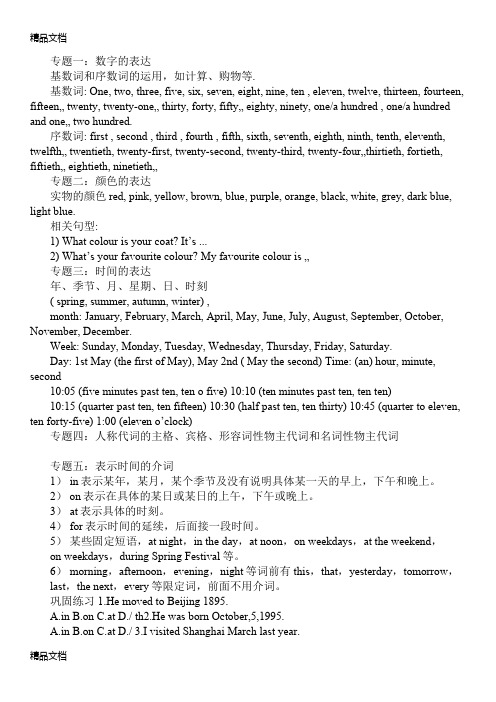
专题一:数字的表达基数词和序数词的运用,如计算、购物等.基数词: One, two, three, five, six, seven, eight, nine, ten , eleven, twelve, thirteen, fourteen, fifteen… twenty, twenty-one… thirty, forty, fifty… eighty, ninety, one/a hundred , one/a hundred and one… two hundred.序数词: first , second , third , fourth , fifth, sixth, seventh, eighth, ninth, tenth, eleventh, twelfth… twentieth, twenty-first, twenty-second, twenty-third, twenty-four…thirtieth, fortieth, fiftieth… eightieth, ninetieth…专题二:颜色的表达实物的颜色red, pink, yellow, brown, blue, purple, orange, black, white, grey, dark blue, light blue.相关句型:1) What colour is your coat? It’s ...2) What’s your favourite colour? My favourite colour is …专题三:时间的表达年、季节、月、星期、日、时刻( spring, summer, autumn, winter) ,month: January, February, March, April, May, June, July, August, September, October, November, December.Week: Sunday, Monday, Tuesday, Wednesday, Thursday, Friday, Saturday.Day: 1st May (the first of May), May 2nd ( May the second) Time: (an) hour, minute, second10:05 (five minutes past ten, ten o five) 10:10 (ten minutes past ten, ten ten)10:15 (quarter past ten, ten fifteen) 10:30 (half past ten, ten thirty) 10:45 (quarter to eleven, ten forty-five) 1:00 (eleven o’clock)专题四:人称代词的主格、宾格、形容词性物主代词和名词性物主代词专题五:表示时间的介词1) in表示某年,某月,某个季节及没有说明具体某一天的早上,下午和晚上。
2017广州新版英语六年级下册每单元知识点总结及练习(可编辑修改word版)
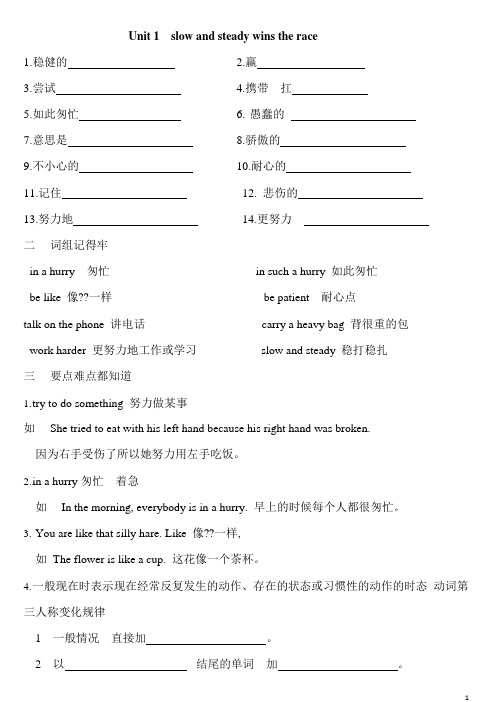
Unit 1 slow and steady wins the race1.稳健的2.赢3.尝试4.携带扛5.如此匆忙6. 愚蠢的7.意思是8.骄傲的9.不小心的10.耐心的11.记住12. 悲伤的13.努力地14.更努力二词组记得牢in a hurry 匆忙in such a hurry 如此匆忙be like 像??一样be patient 耐心点talk on the phone 讲电话carry a heavy bag 背很重的包work harder 更努力地工作或学习slow and steady 稳打稳扎三要点难点都知道1.t ry to do something 努力做某事如 She tried to eat with his left hand because his right hand was broken.因为右手受伤了所以她努力用左手吃饭。
2.i n a hurry 匆忙着急如 In the morning, everybody is in a hurry. 早上的时候每个人都很匆忙。
3.You are like that silly hare. Like 像??一样,如The flower is like a cup. 这花像一个茶杯。
4.一般现在时表示现在经常反复发生的动作、存在的状态或习惯性的动作的时态动词第三人称变化规律3以结尾的单词去加。
4特殊情况。
模块练习一、写出下列单词的第三人称单数形式。
ask---- meet---- teach---- sit----kick---- look---- listen---- eat----put---- knock---- open---- give----see---- pull---- show---- wash----try---- take---- wake---- shut----count---- share---- post---- play----hide---- seek---- hold---- stand----do---- jump---- stop---- touch----二、写出下列动词的原形。
广州英语六年级下学期复习资料
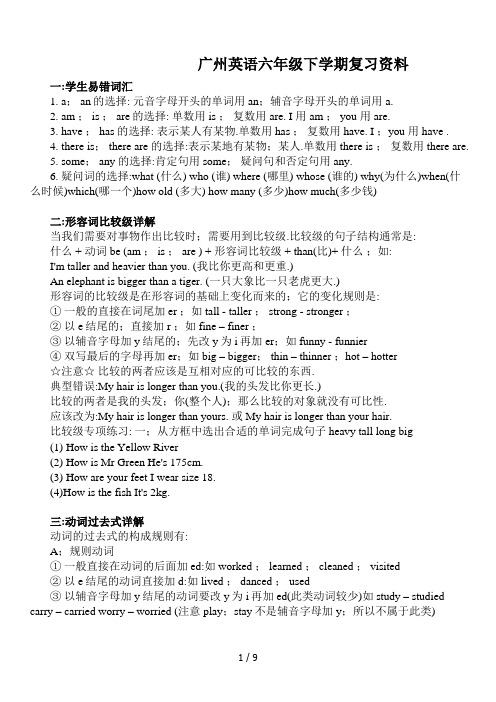
广州英语六年级下学期复习资料一:学生易错词汇1. a; an的选择: 元音字母开头的单词用an;辅音字母开头的单词用a.2. am ; is ; are的选择: 单数用is ;复数用are. I 用 am ; you 用 are.3. have ; has 的选择: 表示某人有某物.单数用has ;复数用have. I ;you 用 have .4. there is; there are 的选择:表示某地有某物;某人.单数用there is ;复数用there are.5. some; any 的选择:肯定句用some;疑问句和否定句用any.6. 疑问词的选择:what (什么) who (谁) where (哪里) whose (谁的) why(为什么)when(什么时候)which(哪一个)how old (多大) how many (多少)how much(多少钱)二:形容词比较级详解当我们需要对事物作出比较时;需要用到比较级.比较级的句子结构通常是:什么 + 动词be (am ; is ; are ) + 形容词比较级 + than(比)+ 什么;如:I'm taller and heavier than you. (我比你更高和更重.)An elephant is bigger than a tiger. (一只大象比一只老虎更大.)形容词的比较级是在形容词的基础上变化而来的;它的变化规则是:①一般的直接在词尾加er ;如 tall - taller ; strong - stronger ;②以e结尾的;直接加r ;如 fine – finer ;③以辅音字母加y结尾的;先改y为i再加er;如funny - funnier④双写最后的字母再加er;如big – bigger; thin – thinner ;hot – hotter☆注意☆比较的两者应该是互相对应的可比较的东西.典型错误:My hair is longer than you.(我的头发比你更长.)比较的两者是我的头发;你(整个人);那么比较的对象就没有可比性.应该改为:My hair is longer than yours. 或My hair is longer than your hair.比较级专项练习: 一;从方框中选出合适的单词完成句子 heavy tall long big(1) How is the Yellow River(2) How is Mr Green He's 175cm.(3) How are your feet I wear size 18.(4)How is the fish It's 2kg.三:动词过去式详解动词的过去式的构成规则有:A;规则动词①一般直接在动词的后面加ed:如 worked ; learned ; cleaned ; visited②以e结尾的动词直接加d:如 lived ; danced ; used③以辅音字母加y结尾的动词要改y为i再加ed(此类动词较少)如 study – studied carry – carried worry – worried (注意play;stay不是辅音字母加y;所以不属于此类)④双写最后一个字母(此类动词较少)如 stoppedB;不规则动词(此类词并无规则;须熟记)小学阶段要记住以下动词的原形和过去式:sing – sang ; eat – ate ; see – saw ; have – had ; do – did ; go - went ; take - took ; buy - bought ; get - got ; read - read ;fly - flew ; am/is - was ;四:动词现在分词详解动词的ing形式的构成规则:①一般的直接在后面加上ing ;如doing ; going ; working ; singing ; eating ②以e 结尾的动词;要先去e再加ing ;如having ; writing③双写最后一个字母的(此类动词极少)有:running ; swimming ; sitting ; getting五:人称代词与物主代词一、人称代词二、物主代词六:句型专项归类1.肯定句:是指用肯定的语气来陈述的句子;如:I'm a student. She is a doctor. He works in a hospital.There are four fans in our classroom. He will eat lunch at 12:00. I watched TV yesterday evening.2;否定句:含有否定词或表示否定意义词的句子;如:I'm not a student. She is not (isn't) a doctor.He does not (doesn't) work in a hospital. There are not (aren't) four fans in our classroom. He will not (won't) eat lunch at 12:00. I did not (didn't) watch TV yesterday evening.☆注意☆小结:否定句主要是在肯定句的基础上加上了否定词 "not".有动词be的句子则"not"加在be后面;可缩写成"isn't;aren't";但am not 一般都分开写.没有动词be的句子则要先在主要动词的前面加上一个助动词(do;does;did);然后在它后面加上"not";你也可以把它们缩写在一起如"don't ; doesn't ; didn't ).这三个助动词要根据人称和时态来选择;其中"does"只用于一般现在时主语是第三人称单数的情况;而"did"只用于一般过去时;不论主语是什么人称和数;都用"did" .3;一般疑问句:是指询问事实的句子;此类句子必须用"yes";或"no"来回答.如:Are you a student Yes; I am / No; I'm not.Is she a doctor Yes; she is. / No; she isn't.Does he work in a hospital Yes; he does. / No; he doesn't.Are there four fans in our classroom Yes; there are. / No; there aren't.(Yes; we are. / No; we aren't.)Will he eat lunch at 12:00 Yes; I will. / No; I will not(won't).Are they swimming Yes; they are. / No; they aren't.Did you watch TV yesterday evening Yes; I did. / No; I didn't.☆注意☆小结:一般疑问句是在肯定句的基础上;①把动词be调到首位;其他照写;末尾标点符号变成问号即可.②没有动词be的句子则要在句首加上一个助动词(do;does;did)再把紧跟在后面的动词变回原形;末尾标点符号变成问号即可.这三个助动词也要根据人称和时态来选择;其中"does"只用于一般现在时主语是第三人称单数的情况;而"did"只用于一般过去时;不论主语是什么人称和数;都用"did" .一般疑问句有个重要的原则就是问和答要一致;即问句里的第一个单词(助动词)和简略答句里的这个词是一致的.4;特殊疑问句:以特殊疑问词(what ; where ; who ; which ; when ; whose ;why ; how等)开头引导的句子.此类句子应该问什么就答什么;不能用"yes ;no"来回答.如:What does he do He's a doctor.Where are you going I'm going to Beijing.Who played football with you yesterday afternoon Mike.Which season do you like best Summer.When do you usually get up I usually get up at 6:30.Whose skirt is this It's Amy's.Why do you like spring best Because I can plant trees.How are you I'm fine. / I'm happy.How did you go to Xinjiang I went to Xinjiang by train.☆其中how又可以和其他一些形容词连用组成特殊疑问词组用来提问;如: how many(多少(数量)); how much(多少(钱)); how tall(多高); how long(多长); how big(多大); how heavy(多重)例句:How many pencils do you have I have three pencils.How many girls can you see I can see four girls.How many desks are there in your classroom There are 51.☆小结:how many 用来提问可数名词的数量;主要有以上三种句式搭配;How many + 名词复数 + do you have 你有多少……How many + 名词复数 + can you see 你能看见多少……How many + 名词复数+ are there… 有多少……七:完全;缩略形式:I'm=I am he's=he is she's=she is they're=they are you're=you are there's=there is they're=they are can't=can not don't=do not doesn't=does not isn't=is not aren't=are not let's=let us won't=will not I'll=I will wasn't=was not总结:通常情况下;'m即am;'s即is(但 let's=let us); 're即are ;n't即not (但can't=can not)八:小学英语词汇不完全归类表学习用品(school things):pen钢笔pencil铅笔 pencil-case铅笔盒 ruler尺子 book书 bag 包漫画书 post card明信片 newspaper报纸 schoolbag书包 eraser橡皮 crayon蜡笔 sharpener 卷笔刀 story-book故事书 notebook笔记本 Chinese book语文书 English book英语书 math book数学书 magazine杂志 dictionary词典人体(body):foot脚 head头 face脸 hair头发 nose鼻子 mouth嘴 eye眼睛 ear耳朵 arm手臂 hand手 finger手指 leg腿 tail尾巴颜色(colours):red红 blue蓝 yellow黄 green绿 white白 black黑 pink粉红 purple紫orange橙brown棕动物(animals):cat猫 dog狗 pig猪 duck鸭 rabbit兔 horse马 elephant大象 ant蚂蚁 fish鱼 bird鸟 eagle鹰 beaver海狸 snake蛇 mouse老鼠 squirrel松鼠 kangaroo袋鼠 monkey猴panda熊猫 bear熊 lion狮子 tiger老虎 fox狐狸 zebra斑马 deer鹿 giraffe长颈鹿 goose鹅hen母鸡 turkey火鸡 lamb小羊 sheep绵羊 goat山羊 cow奶牛 donkey驴 squid鱿鱼 lobster 龙虾 shark鲨鱼seal海豹sperm whale抹香鲸killer whale虎鲸人物(people):friend朋友 boy男孩 girl女孩 mother母亲 father父亲 sister姐妹 brother兄弟 uncle叔叔;舅舅 man男人 woman女人 Mr.先生 Miss小姐 lady女士;小姐 mom妈妈 dad 爸爸 parents父母 grandparents祖父母 grandma/grandmother(外)祖母 grandpa/grandfather(外)祖父 aunt姑姑 cousin堂(表)兄弟;堂(表)姐妹 son儿子 daughter女儿 baby婴儿 kid小孩classmate同学 queen女王 visitor参观者 neighbour邻居 principal校长 university student大学生 pen pal笔友 tourist旅行者 people人物 robot机器人职业(jobs):teacher教师 student学生 doctor医生 nurse护士 driver司机 farmer农民singer歌唱家 writer作家 actor男演员 actress女演员 artist画家 TV reporter电视台记者engineer工程师 accountant会计 policeman(男)警察 salesperson销售员 cleaner清洁工baseball player棒球运动员 assistant售货员 police警察食品;饮料(food & drink):rice米饭 bread面包 beef牛肉 milk牛奶 water水 egg蛋 fish 鱼 tofu豆腐 cake蛋糕 hot dog热狗 hamburger汉堡包 French fries炸薯条 cookie曲奇biscuit饼干 jam果酱 noodles面条 meat肉 chicken鸡肉 pork猪肉 mutton羊肉 vegetable蔬菜 salad沙拉 soup汤 ice冰 ice-cream冰淇淋 Coke可乐 juice果汁 tea茶 coffee咖啡breakfast早餐 lunch午餐 dinner/supper晚餐 meal一餐水果;蔬菜(fruit & vegetables):apple苹果 banana香蕉 pear梨 orange橙 watermelon西瓜 grape葡萄 eggplant茄子 green beans青豆 tomato西红柿 potato土豆 peach桃 strawberry 草莓衣服(clothes):jacket夹克衫 shirt衬衫 T-shirt丅恤衫 skirt短裙子 dress连衣裙 jeans牛仔裤 pants长裤 socks袜子 shoes鞋子 sweater毛衣 coat上衣 raincoat雨衣 shorts短裤sneakers网球鞋 slippers拖鞋 sandals凉鞋 boots靴子 hat(有沿的)帽子 cap便帽 sunglasses 太阳镜 tie领带scarf围巾gloves手套trousers裤子cloth布交通工具(vehicles):bike自行车 bus公共汽车 train火车 boat小船 ship轮船 yacht快艇car小汽车 taxi出租车 jeep吉普车 van小货车;面包车 plane/airplane飞机subway/underground地铁 motor cycle摩托车杂物(other things): window窗户 door门 desk课桌 chair椅子 bed床计算机 board写字板 fan风扇 light灯 teacher's desk讲台 picture图画;照片 wall墙壁 floor地板 curtain窗帘trash bin垃圾箱 closet壁橱 mirror镜子 end table床头柜 football/soccer足球 present礼物walkman随身听 lamp台灯 phone电话 sofa沙发 shelf书架 fridge冰箱 table桌子 TV电视air-conditioner空调 key钥匙 lock锁 photo照片 chart图表 plate盘子 knife刀 fork叉 spoon 勺子 chopsticks筷子 pot锅 gift礼物 toy玩具 doll洋娃娃 ball球 balloon气球 kite风筝jigsaw puzzle拼图游戏 box盒子 umbrella伞 zipper拉链 violin小提琴 yo-yo溜溜球 nest鸟窝 hole洞 tube管子 toothbrush牙刷 menu菜单 e-card电子卡片 e-mail电子邮件 traffic light 交通灯 money钱 medicine药地点(locations):home家 room房间 bedroom卧室 bathroom卫生间 living room起居室kitchen厨房 classroom教室 school学校 park公园 library图书馆 post office邮局 police office警察局 hospital医院 cinema电影院 bookstore书店 farm农场 zoo动物园 garden花园study书房 playground操场 canteen食堂 teacher's office教师办公室 library图书馆 gym体育馆 washroom卫生间 art room绘画教室计算机教室 music room音乐教室 TV room电视机房 flat公寓公司 factory工厂 fruit stand水果摊 pet shop宠物商店 nature park自然公园theme park主题公园 science museum科学博物馆 the Great Wall长城 supermarket超市 bank 银行 country国家 village乡村 city城市 hometown家乡 bus stop公交车站课程(classes): sports体育运动 science科学 Moral Education思想品德课 Social Studies 社会课 Chinese语文 math数学 PE体育课 English英语课国家;城市(countries & cities): China/PRC中国 America/USA美国 UK联合王国England英国 Canada/CAN加拿大 Australia澳大利亚 New York纽约 London伦敦 Sydney 悉尼 Moscow莫斯科 Cairo开罗气象(weather): cold寒冷的 warm温暖的 cool凉爽的 snowy下雪的 sunny晴朗的 hot炎热的 rainy下雨的 windy有风的 cloudy多云的 weather report天气预报景物(nature): river河流 lake湖泊 stream河;溪 forest森林 path小道 road公路 house 房子 bridge桥 building建筑物 rain雨 cloud云 sun太阳 mountain山 sky天空 rainbow 彩虹 wind风 air空气 moon月亮植物(plants): flower花 grass草 tree树 seed种子 sprout苗 plant植物 rose玫瑰 leaf叶子星期(week): Monday星期一 Tuesday星期二 Wednesday星期三 Thursday星期四 Friday 星期五 Saturday星期六 Sunday星期天 weekend周末月份(months): Jan. (January)一月 Feb.(February)二月 Mar.(March)三月 April四月 May 五月 June六月 July七月 Aug.(August)八月 Sept.(September)九月 Oct.(October)十月Nov.(November)十一月Dec.(December)十二月季节(seasons): spring春 summer夏 fall/autumn秋 winter冬方位(directions): south南 north北 east东 west西 left 左边 right右边患病(illness): have a fever发烧 hurt疼痛 have a cold感冒 have a toothache牙疼 have a headache头疼 have a sore throat喉咙疼数词(numbers): one一 two二 three三 four四 five五 six六 seven七 eight八 nine九 ten 十 eleven十一 twelve十二 thirteen十三 fourteen十四 fifteen十五 sixteen十六 seventeen十七 eighteen十八 nineteen十九 twenty二十 thirty三十 forty四十 fifty五十 sixty六十 seventy 七十 eighty八十 ninety九十 forty-two四十二 hundred百 one/a hundred and thirty-six一百三十六 first第一 second第二 third第三 fourth第四 fifth第五 eighth第八 ninth第九 twelfth第十二 twentieth第二十 thirtieth第三十 fortieth第四十 fiftieth第五十 sixtieth第六十seventieth第七十 eightieth第八十 ninetieth第九十 fifty-sixth第五十六形容词(adj.): big大的 small小的 long长的 tall高的 short短的;矮的 young年轻的 old 旧的;老的 strong健壮的 thin瘦的 active积极活跃的 quiet安静的 nice好看的 kind和蔼亲切的 strict严格的 smart聪明的 funny滑稽可笑的 tasty好吃的 sweet甜的 salty咸的 sour酸的 fresh新鲜的 favourite最喜爱的 clean干净的 tired疲劳的 excited兴奋的 angry生气的happy高兴的 bored无聊的 sad忧愁的 taller更高的 shorter更矮的 stronger更强壮的 older 年龄更大的 younger更年轻的 bigger更大的 heavier更重的 longer更长的 thinner更瘦的smaller更小的 good好的 fine好的 great很好的 heavy 重的 new新的 fat胖的 happy快乐的right对的 hungry饥饿的 cute逗人喜爱的 little小的 lovely可爱的 beautiful漂亮的 colourful 色彩鲜艳的 pretty漂亮的 cheap便宜的 expensive昂贵的 juicy多汁的 tender嫩的 healthy健康的 ill有病的 helpful有帮助的 high高的 easy简单的 proud骄傲的 sick有病的 better更好的 higher更高的介词(prep.): in在……里 on在……上;在……时候 under在……下面 near在……的旁边behind在……后边 next to与……相邻 over在……上面 in front of在……前面代词(pron.): I我 we我们 you你;你们 he他 she她 it它 they他(她;它)们 my我的 our 我们的 your你的;你们的 his他的 her她的动词(v.):play(.ed)玩;踢 swim(swam)游泳 skate滑冰 fly(flew)飞 jump跳 walk走 run(ran)跑 climb爬 fight(fought)打架 swing(swung)荡 eat(ate)吃 sleep(slept)睡觉 like像;喜欢have(had)有;吃 turn转弯 buy(bought)买 take(took)买;带 live居住 teach(taught)教 go(went)去study(studied)学习 learn学习 sing(sang)唱歌 dance跳舞 row划 do(did)做 do homework做作业 do housework做家务 watch TV看电视 read(read) books读书 cook the meals做饭 water the flowers浇花 sweep(swept) the floor扫地 clean the bedroom打扫卧室 make(made) the bed 铺床 set(set) the table摆饭桌 wash the clothes洗衣服 do the dishes洗碗碟使用计算机 do morning exercises晨练;做广播操 eat breakfast吃早饭 eat dinner吃晚饭 go to school上学have English class上英语课 play sports进行体育运动 get(got)up起床 climb mountains爬山go shopping买东西 play the piano弹钢琴 visit grandparents看望(外)祖父母 go hiking去远足fly kites放风筝 make a snowman堆雪人 plant trees种树 draw(drew) pictures画画 cook dinner做饭 read a book看书 answer the phone接电话 listen to music听音乐 clean the room 打扫房间 write(wrote) a letter写信 write an e-mail写电子邮件 drink(drank) water喝水 take pictures照相 watch insects观察昆虫 pick up leaves采摘树叶 do an experiment做实验 catch butterflies捉蝴蝶 count insects数昆虫 collect insects收集昆虫 collect leaves收集树叶 write a report写报告 play chess下棋 have a picnic举行野餐 get to到达 ride(rode) a bike骑自行车play the violin拉小提琴 make kites制作风筝 collect stamps集邮 meet(met)见面欢迎 thank 谢谢 love爱 work工作 drink(drank)喝 taste尝 smell闻 feed(fed)喂养 shear剪 milk挤奶 look 看 guess猜 help帮助 pass传递 show展示 use使用 clean打扫 open打开 close关上 put放paint绘画 tell(told)告诉 kick踢 bounce反弹 ride(rode)骑 stop(stopped)停 wait等 find(found)寻找到 drive(drove)驾驶 fold折 send(sent)寄 wash洗 shine照耀变成 feel(felt)感觉到think(thought)思考 meet(met)遇见 fall(fell)落下 leave(left)离开 wake(woke) up醒来 put on穿上 take off脱掉 hang up挂起 wear(wore)穿 go home回家 go to bed上床睡觉玩电脑游戏play chess下棋 empty the trash倒垃圾 put away the clothes收拾衣服 get off下车 take a trip 去旅行 read a magazine读杂志 go to the cinema去看电影 go straight向前直走。
广州版小学英语六年级下复习

教学内容:词汇,专题练习教学目标:词汇,专题练习重点和难点:词汇,专题练习1.ago/ beforeago 只用于一般过去时,表示从现在算起的一段时间以前。
[例]__________________他是两年前去世的。
before 后接“时间点”,可用于任何时态;它也可放在“时间段”后,用于完成时_____________________________或一般过去时。
[例] I got there before 5 o’clock.我五点钟前到达那里。
I never saw him before.我以前没见过他。
He had done it two days before.他两天前就做过此事。
I met him three years __________.(距今)三年前,我遇到他。
I had met him three years ____________ .(距当时)三年前我见到他一次。
1.I remembered seeing you somewhere 2 years______.2.I have read the novel______.3.She said she had met Tom two days______.4.She has been there since 3 years_______. ..........................................................................2. already/ yet/still1) already 意为“已经”,常用于肯定句,与完成时和进行时连用为多。
用于疑问句时表示问话人持怀疑、惊异的态度。
如:Is it Sunday already?已经到星期天啦?I have already finished it.我已经做完了。
(2)yet 通常用于疑问句和否定句,在疑问句中作“已经”解,在否定句中作“还”、“尚未”解。
广州最新版小学六年级英语下册知识点归纳和习题(全册)

广州版小学六年级英语下册知识点归纳和习题Unit 1 slow and steady wins the race一、课前小测1.稳健的_____________________2.赢_____________________3.尝试_____________________4.携带、扛_______________5.如此匆忙_____________________6.讲电话________________7.意思是_____________________ 8.骄傲的__________________9.不小心的_____________________ 10.耐心的________________11.记住_____________________ 12.悲伤的_______________13.努力地_____________________ 14.更努力______________二、词组记得牢in a hurry 匆忙in such a hurry 如此匆忙be like 像??一样be patient 耐心点talk on the phone 讲电话carry a heavy bag 背很重的包work harder 更努力地工作或学习slow and steady 稳打稳扎三、要点难点都知道1.try to do something 努力做某事,如She tried to eat with his left hand because his right hand was broken.因为右手受伤了所以她努力用左手吃饭。
2.in a hurry 匆忙、着急如:In the morning, everybody is in a hurry.早上的时候每个人都很匆忙。
3. You are like that silly hare.Like 像??一样,如:The flower is like a cup. 这花像一个茶杯。
广州小学六年级英语总复习(比较级)

六年级英语总复习形容词或副词的原级——比较级——最高级规则变化:1比较级直接加er,最高级加est (old—older—oldest)2有e结尾,比较级加r ,最高级加st (late—later—latest)3辅音加y 结尾,比较级去y 加ier ; 最高级去y 加iest (ugly—uglier—ugliest)4辅元辅音结尾, 比较级双写末尾字母加er , 最高级双写末尾字母加est (big—bigger—biggest)不规则变化:1某些双音节词和大部分多音节词,比较级前加more,最高级前加most 2特殊变化good/well , bad/badly , many ,little/few,1)old—older—oldest老的旧的new—newer—newest新的small—smaller—smallest 小的strong—stronger—strongest强壮的long—longer—longest长的short—shorter—shortest 短的fast—faster—fastest快的high—higher—highest 高的cool—cooler—coolest凉的cold—colder—coldest冷的warm—warmer—warmest 暖的hard—harder—hardest 硬的难的full—fuller—fullest满的饱的weak—weaker—weakest 瘦弱的dark—darker—darkest黑暗的tall—taller –-tallest高的kind—kinder—kindest友善的和蔼的bright—brighter—brightest明亮的poor—poorer—poorest 穷的low—lower—lowest 低的light—lighter—lightest轻的2)white—whiter—whitest白的late—later—latest迟的晚的fine—finer—finest好的trouble—troubler—troublest麻烦的large—larger—largest巨大的strange—stranger—strangest奇怪的pale—paler—palest苍白的nice—nicer—nicest好的3)ugly—uglier—ugliest丑的healthy—healthier—healthiest健康的friendly—friendlier—friendliest友好的happy—happier—happiest 高兴的lovely—lovelier—loveliest可爱的easy—easier—easiest容易的dirty—dirtier—dirtiest脏的hungry—hungrier—hungriest饿的heavy—heavier—heaviest重的sunny—sunnier—sunniest晴朗的early—earlier—earliest早的dry—drier—driest干的windy—windier—windiest有风的rainy—rainier—rainiest有雨的cloudy—cloudier—cloudiest多云的snowy—snowier—snowiest下雪的foggy—foggier—foggiest有雾的pretty—prettier—prettiest漂亮的lucky—luckier—luckiest幸运的tidy—tidier—tidiest整洁的4)big—bigger—biggest大的hot—hotter—hottest热的fit—fitter—fittest合适的thin—thinner—thinnest 瘦的wet—wetter—wettest湿的fat—tatter—fattest肥的slim—slimmer—slimmest 苗条的5)many—more—most多的bad/badly—worse—worst坏的good/well—better—best好的little/few—less—lest 少的6)boring—more boring—most boring 烦闷的patient—more patient—most patient有耐性的famous—more famous—most famous著名的slowly—more slowly—most slowly慢的excited—more excited—most excited激动的modern –more modern—most modern 现代的crowded more crowded ,most crowded拥挤的7)beautiful—more beautiful—most beautiful美丽的comfortable—more comfortable—most comfortable 舒适的interesting--more interesting -- most interesting 有兴趣的delicious—more delicious -- most delicious 美味的different—more different—most different 不同的important—more important—most important 重要的dangerous—more dangerous—most dangerous 危险的favourite—more favourite—most favourite喜爱的hardworking—more hardworking—most hardworking 用功的horrible—more horrible—most horrible 可怕的练习:写出下列单词的比较级与最高级1)tidy______ ____ 2)hungry_______________ 3)friendly_______________ 4)heavy________________5)boring_________________ 6)hot_______________ 7)bad_______________ 8)excited_________________ 9)white______________ 31)large_______________32)thin______________ 33)nice___________________ 34)beautiful_______________ 35)hardworking__________________ 36)delicious____________ 37)patient________________把下列句子改为同义句(合并句子)1、Tom is ten years old. Sally is twelve years old.Sally is years than Tom.Tom is years than Sally.2. Ben is 1.50 meters tall . Yongxin is 1.60 meters tall.Ben is Yongxin.Yongxin is Ben.3. My bedroom is small. My mother’s bedroom is big.My mother’s bedroom is than .My bedroom is than .4. Jim is 40 kilos. Mike is 55 kilos.Jim is Mike.Mike is Jim.5. I run faster than Sally. Joan runs faster than me.Joan runs the three.6.Elephants are bigger than horses. Blue whales are bigger than elephants.Blue whales are of the three.Horses are of the three.7. Frog can jump higher rabbit . Kangaroo can jump higher than frog.Kangaroo can jump the three.Rabbit can jump the three.。
广州版小学英语六年级下册:Unit6-Unit10综合复习

Unit6-Unit10综合复习Warming Up一.听写__________________________________________________________________________________ __________________________________________________________________________________ __________________________________________________________________________________ __________________________________________________________________________________ __________________________________________________________________________________ __________________________________________________________________________________ __________________________________________________________________________________ 二.单词及短语【unit 6重点单词与短语】1.成功的_______________________2.或许________________________3.买;出售_____________________4.真的________________________5.公司_________________________6.一次________________________7.回到_________________________ 8.失去;丢失__________________9.完成_________________________ 10.变成现实___________________11.再一次______________________ 12.把......变成......_______________13.玩平板电脑__________________ 14.看卡通片___________________15.在2月24日_________________ 16.完成学业___________________17.变得厌倦____________________ 18.开始去做___________________【unit 7重点单词与短语】1.座位_________________________2.没有礼貌的__________________3.需要(的时候)__________________4.嘲笑________________________5.队___________________________6.排队________________________7.插队_________________________ 8.满的________________________9.大笑_________________________ 10.方法;态度_________________11.在公共汽车上________________ 12.让位给她___________________13.需要的人们__________________ 14.排队等候___________________ 15.在超市______________________【unit 8重点单词与短语】1.魔术的________________________2.中级的;中等的_______________3.指示牌________________________4.没有人_______________________5.大声喊________________________6.底部_________________________7.在里面________________________8.黑暗的_______________________9.除......以外_____________________ 10.点燃________________________ 11.明亮的_______________________ 12.路__________________________ 13.指引;引路___________________ 14.永远;曾经__________________ 15.走路穿过公园_________________ 16.在......中间___________________ 17.努力猜_______________________ 18.没有一个____________________ 19.在......底部____________________ 20. ......的里面___________________ 【unit 9重点单词与短语】1.南非__________________________2.大自然_______________________3.选择__________________________4.歌剧_________________________5.桥____________________________6.悉尼_________________________7.东京__________________________8.在国外_______________________9.首都__________________________ 10.大山;山脉__________________ 11.现代化的_____________________ 12.塔__________________________ 13.去任何一个国家旅游___________ 14.在世界上____________________ 15.在南非_______________________ 16.一个去......的好地方___________ 17.去国外旅游___________________ 18.世界美食之都________________ 【unit 10重点单词与短语】1.自然的________________________2.美景________________________3.瀑布__________________________4.唐人街______________________5.多伦多________________________6.护照________________________7.订购__________________________8.票__________________________9.飞机场______________________ 10.着陆;陆地_________________11.邀请_______________________ 12.钱_________________________ 13.等不及做___________________ 14.兴奋地做___________________ 15.节约钱_____________________ 16.给你买一个礼物_____________ 17.因......而出名________________ 18.计划去做......________________ 19.到达飞机场_________________ 20.在6月12日________________三.课文内容【unit 6重点句型】1.He made these things _________________(变成现实).2.Steve ________________(出生于) America on February 24th ,1955.3.When he finished school,he ______________(从事......工作) a computer game-maker.4.But he quickly _________________(变得厌倦).5.In 1976 he and his friend _______________(开始) build computers in their home.6.People loved their computers and Steve ____________________(赚了很多钱).7.________________(再一次) he was very successful.8.In 1998 Steve sold his movie company and ________________(返回) Apple.9.After he returned,he __________ Apple ___________ (把......变成) the world’s biggest company.10.When Steve Jobs died in 2011,the world ___________(失去了) a great man .【unit 7重点句型】1.What will you do if you see an old lady ____________________(站在公交车上)?2.If she does not _______________(有一个座位), I will give her my seat.3.Today on the bus,I ________________(站起来) to give my seat to an old lady.4.A young man quickly __________________(坐下).5.We should always give our seat to people _____________(有需要的).6.It’s the __________(有礼貌的) thing to do.7.I don’t like _____________________(不礼貌的人).8.I ___________________(排队等候) at the supermarket,a girl tried to ____________(插队).9.People should always ________________(排队等候).10.If the line is long,don’t push in.__________________(请耐心)!【unit 8重点句型】1.Long ago,a little boy was___________________(走路穿过) a park.2._________________(在公园的中间) there was a tree with a sign on it.3.The boy _______________(试图) guess the magic words.4.He tr ied “open” “hurry”,and many more,but_______________(它们都不)worked.5.Tired and upset,the boy_______________(大喊),“This is too difficult.Please ,deer tree!”6.Suddenly,a big door opened _____________________(树底下) the tree.7.Inside everything was dark,______________(除......之外) a sign.8.“_______________(继续) with your magic.”Then the boy said.9.________________(在......的内部) the tree____________(被点亮) and showed a road.10.The road ______________(通向) a room _____________(装满) toys and chocolates.【unit 9重点句型】1.If you can travel to____________________(任何一个国家),where will you go?2.I love nature and ____________(在南非) I can see many_________________(漂亮的大山和森林).3.I’d like to see the ________________(悉尼歌剧院) and _________________(海港大桥).4.Tokyo is ____________(如此摩登) and it’s a great place to go shopping ,too.5._______________(我想去买) to buy a robot here.6.If I can ________________(去国外旅游) I will go to France,of course.7.I love food and people say that Paris is ____________________(世界美食之都)!8.Daniel _______________(过去常常) live in the countryside.【unit10重点句型】1.Thanks so much _________ inviting me ________ visit you in Canada.2.I_________________________(迫不及待想见到你).3.I’m very excited ____________ stay ___________ your family(我很兴奋能和你的家人住在一起).4.I can speak English every day and ___________________(对你的国家有更多了解).5.Don’t worry,I will buy you a present _____________(用) that money.6.I know Canada __________________(因......而闻名) its natural beauty.7.And I ________________(计划去) visit Chinatown in Toronto,too.8.I finally got my passport last week and I _________(订) my plane ticket today.9.I will ______________(到达) the airport next month,on June 12th.10.The plane _________(着陆) at 1:00 p.m.Language Points【unit 6-unit 10常考点与易错点】1.时间状语从句After he returned,he turned Apple into the world’s biggest company.在他回来之后,他把“苹果(公司)”变成了世界上最大的公司。
广州版最新版小学六年级下册知识点归纳和习题全册
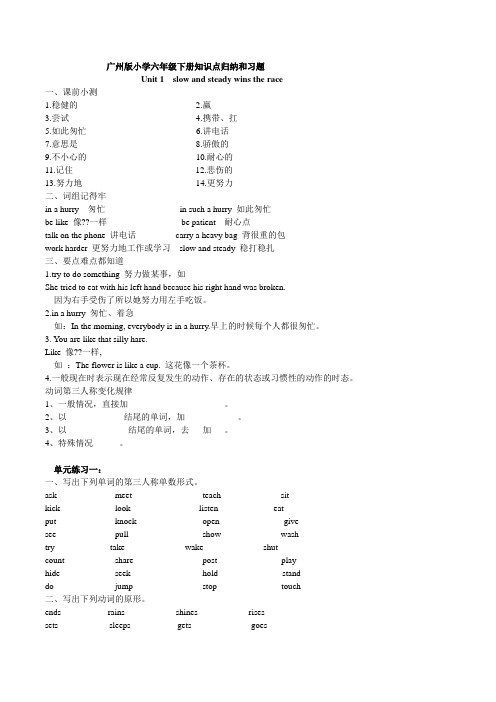
广州版小学六年级下册知识点归纳和习题Unit 1 slow and steady wins the race一、课前小测1.稳健的_____________________2.赢_____________________3.尝试_____________________4.携带、扛_______________5.如此匆忙_____________________6.讲电话________________7.意思是_____________________ 8.骄傲的__________________9.不小心的_____________________ 10.耐心的________________11.记住_____________________ 12.悲伤的_______________13.努力地_____________________ 14.更努力______________二、词组记得牢in a hurry 匆忙in such a hurry 如此匆忙be like 像??一样be patient 耐心点talk on the phone 讲电话carry a heavy bag 背很重的包work harder 更努力地工作或学习slow and steady 稳打稳扎三、要点难点都知道1.try to do something 努力做某事,如She tried to eat with his left hand because his right hand was broken.因为右手受伤了所以她努力用左手吃饭。
2.in a hurry 匆忙、着急如:In the morning, everybody is in a hurry.早上的时候每个人都很匆忙。
3. You are like that silly hare.Like 像??一样,如:The flower is like a cup. 这花像一个茶杯。
广州版小学英语六年级下册:Unit1-Unit5综合复习
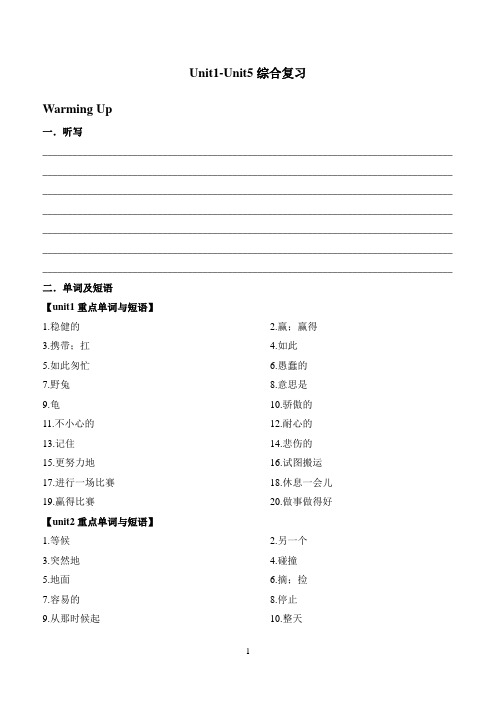
Unit1-Unit5综合复习Warming Up一.听写__________________________________________________________________________________ __________________________________________________________________________________ __________________________________________________________________________________ __________________________________________________________________________________ __________________________________________________________________________________ __________________________________________________________________________________ __________________________________________________________________________________ 二.单词及短语【unit1重点单词与短语】1.稳健的__________________________2.赢;赢得_______________________3.携带;扛________________________4.如此___________________________5.如此匆忙________________________6.愚蠢的_________________________7.野兔____________________________ 8.意思是_________________________9.龟______________________________ 10.骄傲的________________________ 11.不小心的_______________________ 12.耐心的________________________ 13.记住___________________________ 14.悲伤的________________________ 15.更努力地_______________________ 16.试图搬运______________________ 17.进行一场比赛___________________ 18.休息一会儿____________________ 19.赢得比赛_______________________ 20.做事做得好____________________ 【unit2重点单词与短语】1.等候__________________________2.另一个_________________________3.突然地________________________4.碰撞___________________________5.地面__________________________6.摘;捡_________________________7.容易的________________________ 8.停止___________________________9.从那时候起____________________ 10.整天__________________________11.努力吧;加油_________________ 12.跑掉__________________________ 13.在田里_______________________ 14.撞到树上______________________ 15.倒在地上_____________________ 16.把它带回家____________________ 17.吃了一顿美餐_________________ 18.自言自语______________________ 19.停止工作_____________________ 20.没有东西吃____________________ 【unit3重点单词与短语】1.困难的________________________2.青蛙__________________________3.头发__________________________4.袋鼠__________________________5.轮回__________________________6.海洋__________________________7.海星__________________________8.老虎__________________________9.熊猫__________________________ 10.竹子_________________________ 11.大象_________________________ 12.长颈鹿_______________________ 13.后面的_______________________ 14.脖子_________________________ 15.玩个游戏_____________________ 16.动物的名字___________________ 17.两条强壮的后腿_______________ 18.喜欢吃肉_____________________ 19.生活在非洲___________________ 20.百兽之王_____________________ 【unit4重点单词与短语】1.拯救;节省____________________2.唯一的;仅仅_________________3.地球__________________________4.危险_________________________5.消失__________________________6.森林_________________________7.污染__________________________8.制造_________________________9.皮毛__________________________ 10.永远________________________ 11.处于危险中___________________ 12.用......制造___________________ 13.污染海洋_____________________ 14.砍伐森林____________________ 15.许多其他动物_________________ 16.没有地方住__________________ 17.由动物制成的_________________ 18.种树________________________ 【unit5重点单词与短语】1.著名的________________________2.人___________________________3.历史__________________________4.领袖__________________________5.自由的________________________6.使得__________________________7.发明家________________________8.发明__________________________9.作家__________________________ 10.灯泡_________________________ 11.电影_________________________ 12.音乐家_______________________ 13.画家_________________________ 14.有趣的_______________________ 15.一本关于......的书______________ 16.在中国历史上_________________ 17.有关......的一些东西____________ 18.努力去做......__________________ 19.试着做......____________________ 20.改善他们的生活_______________三.课文内容【unit1重点句型】1.I didn’t want to________________(回到) the classroom again.2.---Why are you __________________(如此匆忙)?---Because I have so many things to do.3.You are like that ____________ (愚蠢的) hare.4.The hare was sure he would win so he __________________(休息了一会儿).5.If I want to do something well,I should be _________________(细心和耐心).【unit2重点句型】1.___________(突然地) a hare ran very fast and _____________(撞到) a tree.2.It ______________(倒在地上) the ground and died.3.He ___________ (捡起)the hare and _____________(把它带回家).4.He cooked it and __________________(吃了一顿美餐).5.___________________(从此之后),the farmer stopped working.6.All day long,he sat _______________(在田地里) and ____________(等待) a hare to appear.7.All the animals ________________(跑掉).8.But another hare never came,so the farmer ______________________(没有东西吃).9.The people _____________ believe the boy _____________(不再) and the wolf ate all the sheep.10.You must always _________________(说实话).【unit3重点句型】1.L et’s_________________(玩个游戏吧).2.It has two strong back legs and can __________________(跳得很远).3.This animal ________________(看起来像) a star and it lives _______________(在海洋里).4.It’s yellow and _______________(生活在非洲).5.It’s also called the “________________________(百兽之王)”.【unit4重点句型】1.These and many other animals are___________________(处于危险中).2.If we don’t do something now,they may all _________________(永远消失)!3.One problem is that their homes are_____________(正在消失).4.People _______________(砍倒) the forests and ___________(污染) the oceans,so these animals__________________________(无处可住).5.Many people buy things __________________(由......制造) these animals.6.If you love the earth and love the animals, please ______________________(采取行动).7.Plant trees and ___________________(不要污染环境).8.If we all work together we can still __________(拯救) the animals.【unit5重点句型】1.---What are you reading?---_______________(一本关于......的书)Dr Sun Yatsen.2.He’s a very ________________________(一个很有名而且很重要的人) in Chinese history.3.Can you tell me ________________________(一些有关他的事情吗)?4.He______________________________(努力解放中国人民) and make their lives better.5.__________ a great man! (多么伟大的人啊!)Language Points【unit1-unit 5常考点与易错点】1. 动词-ing形式作主语Working in the field every day is hard work.每天在田地里干活是辛苦的工作。
广州六年级英语下册知识点

广州六年级英语下册知识点广州六年级英语下册的知识点涵盖了多个方面,包括词汇、语法、听力、口语、阅读和写作。
以下是一些核心知识点的概述:词汇学习- 学习与日常生活相关的词汇,如家庭成员、学校设施、日常活动等。
- 掌握一些基本的形容词和副词,如big, small, quickly, slowly 等。
- 学习一些基本的动词短语,例如look up, turn on, take off等。
语法要点- 学习一般现在时、一般过去时和一般将来时的用法。
- 掌握名词的单复数形式,以及名词所有格的构成。
- 学习使用现在进行时来描述正在进行的动作。
- 理解并使用简单的条件句,如“If it rains, we will stay at home.”听力技巧- 通过听力练习提高对英语语音和语调的识别能力。
- 学习如何从对话或短文中提取关键信息。
口语表达- 练习日常对话,如问候、介绍、询问时间等。
- 学习如何用英语描述自己的喜好、计划和经历。
阅读理解- 阅读简单的英语故事、短文或对话,理解大意和细节。
- 学习如何通过上下文猜测生词的意思。
写作技能- 学习写简单的句子和段落,如自我介绍、描述一天的活动等。
- 练习写日记或书信,表达个人情感和观点。
文化知识- 了解一些英语国家的文化习俗,如节日庆祝方式、饮食习惯等。
复习和测试- 定期复习所学知识,通过练习题和模拟测试来巩固学习成果。
结束语六年级的英语学习是一个重要的阶段,它为学生打下了坚实的基础,为今后更高级的英语学习做好准备。
通过不断的练习和应用,学生们可以更加自信地使用英语进行交流。
希望以上的知识点能够帮助学生们更好地掌握六年级英语下册的内容。
- 1、下载文档前请自行甄别文档内容的完整性,平台不提供额外的编辑、内容补充、找答案等附加服务。
- 2、"仅部分预览"的文档,不可在线预览部分如存在完整性等问题,可反馈申请退款(可完整预览的文档不适用该条件!)。
- 3、如文档侵犯您的权益,请联系客服反馈,我们会尽快为您处理(人工客服工作时间:9:00-18:30)。
教学内容:词汇,专题练习教学目标:词汇,专题练习重点和难点:词汇,专题练习1.ago/ beforeago 只用于一般过去时,表示从现在算起的一段时间以前。
[例]__________________他是两年前去世的。
before 后接“时间点”,可用于任何时态;它也可放在“时间段”后,用于完成时_____________________________或一般过去时。
[例] I got there before 5 o’clock.我五点钟前到达那里。
I never saw him before.我以前没见过他。
He had done it two days before.他两天前就做过此事。
I met him three years __________.(距今)三年前,我遇到他。
I had met him three years ____________ .(距当时)三年前我见到他一次。
1.I remembered seeing you somewhere 2 years______.2.I have read the novel______.3.She said she had met Tom two days______.4.She has been there since 3 years_______. ..........................................................................2. already/ yet/still1) already 意为“已经”,常用于肯定句,与完成时和进行时连用为多。
用于疑问句时表示问话人持怀疑、惊异的态度。
如:Is it Sunday already?已经到星期天啦?I have already finished it.我已经做完了。
(2)yet 通常用于疑问句和否定句,在疑问句中作“已经”解,在否定句中作“还”、“尚未”解。
如:I haven’t learned it yet.我还不知此事。
Has he come yet?他还没有来?(表疑问)( )1.——Have you travelled on the train .——Yes, I have.(A)never (B)ever (C)just (D)yet( )2.——Have you finished your homework——Not .(A)ever (B)already (C)yet (D)just( )3. We haven't finished our homework .(A)already (B)ever (C)yet (D)never( )4.——Have you learned English?——Yes, I've learned a lot.(A)never,ever (B)ever,never (C)ever,already (D)already.ever ( )5.——Have you finihed your homework ?——Yes,I've done that(A)yet,already (B)already, yet (C)ever,never (D)still,just( )6.John's father borrowed some pictures(A)have already (B)has already(C)have ever (D)has yet( )7.He finished his homework yet(A)doesn’t (B)haven’t (C) hasn’t (D) doesn’t have ..........................................................................3.arrive / reach/ get(1) arrive vi.arrive + in + 大地方(国家、城市等)arrive + at + 小地方(村庄、车站、码头等)He __________Nanning last week. 他上星期来到南宁。
He ___________the railway station. (已经)(2) get vi.\get to + 名词When did you get to the station yesterday?你昨天什么时候到达火车站?(3)reach vt.\reach + 名词Please write to me when you reach Beijing.你到北京后请给我写信。
当reach、arrive、get后接地点副词here、there、home时,不能后接任何介词。
如:I got/ arrive/ reached home late yesterday.我昨天很晚才到家。
1. When did Jim ______ subway station?A. getB. reachC. arrive toD. reach to2. I usually ______at about 5 o'clock in the afternoon.A. get to homeB. arrive at homeC. arrive in homeD. get home3. - Why are you in such a hurry?- We‘re supposed to _____ the shop early.A. get toB. arriveC. arrive inD. reach at4 When did you arrive _______ the village?A. inB. atC. toD. with5. Don’t forget to write to as soon as you _______ Australia.A. arriveB. reachC. getD. come6. Jackie usually ______ home at five in the afternoon.A. arrive atB. gets toC. arrives inD. gets4. between/ among这两个词都有“在……之间(中)”的意思,但用法不同:(1)between用于表示双方之间的关系,不论双方的数目是多少。
The train runs ____Beijing and Nanning.火车在北京和南宁两地间运行。
There is a tree between the two houses.这两座房子之间有一棵树。
(2)among后接人或物必须是三个或三个以上,在一群、一组或一个整体中间。
如:I saw him among the crowd.我看见他在人群中。
London is _____________________伦敦是世界上最大的城市之一。
5. both/ all这是一组代词,也可以作形容词,但要正确使用它们,必须区别他们所指的范围。
(1)both指“两者都”(=2),其否定应为neither。
His two brothers are both workers.他的两个兄弟都是工人。
They both work in our school.他们俩都在我们学校上班。
both的位置:系动词be后,实义动词前。
(2)all指“三个或三个以上都……”,否定应为none。
The students all work hard.学生们都很用功。
They are all here today.他们今天都在这里。
They are all strangers. I know none of them.他们全是陌生人,他们当中我一个都不认识。
6. die / dead/ dying/ death(1)die 是终止性动词,不用于被动语态。
He has died.他死了。
He ______________.他五周前死的。
(2)dead是形容词,表状态,可以跟表示延续的时间状语连用。
His grandfather has been dead for five years.他的祖父去世已经有五年了。
(3)death是名词。
He was sentenced to death.他被判处死刑。
(4)dying意为“要死了”,是现在分词。
试比较:a dead dog ___________ a dying dog _______________初中常见的die短语:die from(外因)/ of(内因)……因……而死7. hope/ wish这两个词都有“希望”的含义,hope一般指“希望”,wish指的是“愿望”。
二者在使用上有如下区别:(1)相同点:wish和hope都可接宾语从句。
如:I hope that he can help me.我希望他能帮助我。
I wish that I knew the answer.我希望我知道这个答案。
但hope所表示的希望一般是能够实现的,而wish所表达的愿望一般是难以实现或根本不可能的,所以其所接宾语从句中的动词用虚拟语气。
(2)不同点:A. hope to do sth. (√)hope sb. to do sth. (×)wish sb. to do sth. (√)B. hope sb. sth. (×)wish sb. sth. (√)I wish you_________________________我希望你在晚会上玩得愉快!I wish you a Happy New Year!祝你新年快乐!8.spend/ take/ cost/pay这三个动词都可用来表示“花费”时间,使用时应注意:(1)take常用it作主语。
句型:It takes sb. time to do sth. 如:________________________________(过去时)完成这项工作用了我3个小时。
(2)spend则用人作主语,常用的句型是“sb. spends time (in) doing sth.”。
He_______________________________(过去时)他用了30分钟写那封信。
(3)cost 表示花时间时不能用于表示花具体时间(如几个小时、几天等),其宾语多是表示含糊的时间(如 a long time, much time等),再就是它不能用表示人的词语作主语,如:Doing the work cost the workers a long time.做这项工作花了工人们很长的时间。
